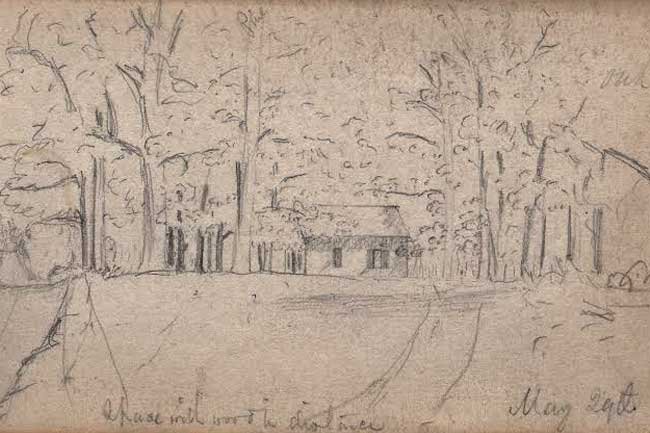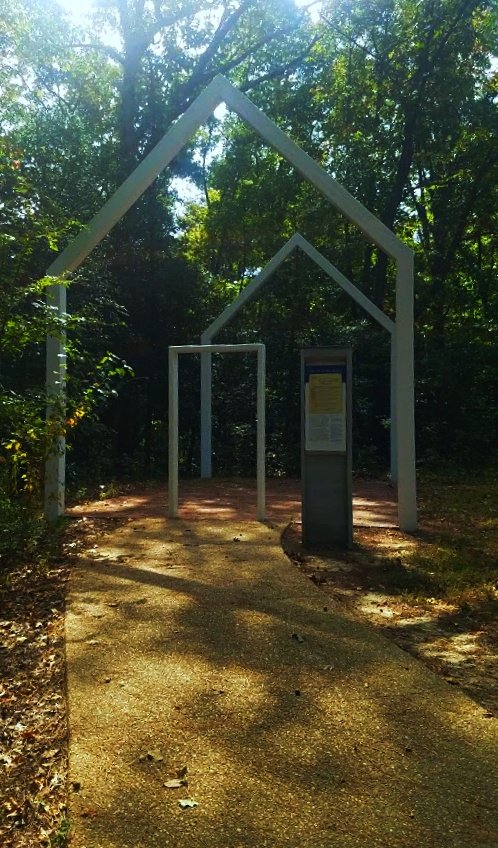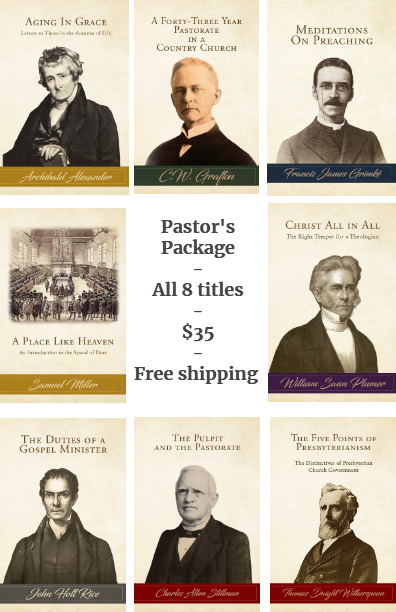Receive our blog posts in your email by filling out the form at the bottom of this page.
We must always remember when we turn one eye upon ourselves and our guilt, blemishes, vileness, and loathsomeness, we must let the other eye be fixed upon Jesus Christ! — William Robinson
William Robinson is one of the most influential colonial American Presbyterian ministers about whom we know so little. He was born in England, the son of a well-to-do Quaker physician, around the beginning of the 18th century, and after falling into the sins of big city life in London, made his way to America to work as a teacher, before a conversion experience led him to become a student for the ministry at William Tennent’s Log College. Samuel Miller tells the story of that experience in his biography of John Rodgers:
He was riding at a late hour, one evening, when the moon and the stars shone with unusual brightness, and when every thing around him was calculated to excite reflection. While he was meditating upon the beauty and grandeur of the scene which the firmament presented, and was saying to himself, "How transcendently glorious must be the Author of all this beauty and grandeur," the thought struck him with the suddenness and force of lightning: "But what do I know of this God? Have I ever sought His favor or made Him my friend?" This happy impression, which proved, by its permanence and effects, to have come from the best of all sources, never left him until he took refuge in Christ as the hope and life of his soul.
Marker located at the Historic Polegreen Church in Mechanicsville, Virginia (photo by R. Andrew Myers).
An alumni of William Tennent’s Log College; Robinson was called to succeed William Tennent as pastor of the Neshaminy Presbyterian Church, but declined the call; he was a leader of the Great Awakening, and a friend of George Whitefield and Gilbert Tennent; he served as moderator of New Brunswick Presbytery; and he preached the first Presbyterian sermon in central Virginia (July 6, 1743), and paved the way for the ministry of Samuel Davies, who wrote of him that "The work was begun and mainly carried on by that favored man, Mr. Robinson, whose success, whenever I reflect on it, astonishes me.” Davies also said:
Probably Mr. Robinson, during the short period of his life, was the instrument in the conversion of as many souls as any minister who ever lived in this country. The only circumstance relating to his person which has come down is that he was blind of one eye [as a result of scarlet fever]; so that he was called by some “the one-eyed Robinson.”
It was his dying wish that Davies would be sent to minister to the people of Hanover County, Virginia, where Robinson had preached three years before, and accepted a financial gift from his grateful hearers only with the proviso that it would go to support Davies’ theological education. He died on August 1, 1746, just six years after his ordination to the ministry, and his funeral sermon was preached by Samuel Blair. But although the stories of his travels throughout Maryland, Virginia, North Carolina and his ministry in Delaware, are fascinating to read, and his role in the education and missionary efforts of Samuel Davies was key to bringing the Great Awakening to Virginia, we have nothing to read that was written by his own hand — or so it was thought until very recently.
James P. Williams is an American Baptist minister who was serving as pastor of four Baptist churches in England from 2007 to 2010. While cleaning one of those churches, he discovered a letter from William Robinson to his [unnamed, female] cousin in England dated June 16, 1741. The letter is transcribed in his book Light the Fire Again: Eighteenth-Century Light for the Twenty-First Century Darkness, which tells more fully than has been done before the story of Robinson’s life and ministry. The letter rejoices in the news that Robinson had received that his cousin was born again. He tells her about reports he has heard from George Whitefield concerning revival in England, and gives a report on revival throughout the northern colonies:
…here has been such Surprising Effusions of God’s spirit in the ministry Especially under Mr. Whitfield & our new Brunswick Presbytery in which are the famous Tennents my dear brethren, that all New England, the Provinces of York, the Jersies, Pensilvania, and Maryland are filled with Convinced & Converted souls, many are the thousand Brot to Christ and on the way Children, youth & aged persons, rich & poor, Black & White, tis no Great Matter here to preach unto Five Thousand People, for my Brethren to preach 3-4 or 5 times a day.
It is a letter that practically drips with the sweet savor of the gospel. In all his rejoicing of the communion in Christ which he now shares with his cousin, and in all his descriptions of revival, Robinson is concerned to give God the glory rather than himself or even those brethren of whom he speaks so highly. Robinson: “I cannot tell what great things God has done for ME, what honors conferred on me a poor ignorant wretch. Oh that I may be humble and thankful.” The work of both conversion and revival is by the hand of God, and brings Robinson to a humble adoration of the One who has merciful done and continues to do great things among the people on both sides of the pond. The whole letter takes up a handful of pages in transcription, and Williams helpfully includes a summary of its highlights as well. The life story of Robinson is given in Light the Fire Again with a view towards inspiring 21st century readers to catch the flame that stirred Robinson, Whitefield, the Tennents, Davies, Jonathan Edwards and others in the 18th. We are most grateful to Williams for finding Robinson’s letter and sharing its contents with this generation. May that spark contained within, by the grace of God, help to light the world again today!














